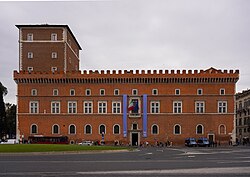
Back Palazzo Venezia Afrikaans Палацца Венецыя Byelorussian Палацо Венеция Bulgarian Palazzo Venezia Catalan Palazzo Venezia Czech Palazzo Venezia German Παλάτσο Βενέτσια Greek Palacio Venecia Spanish Venezia jauregia Basque Palazzo Venezia Finnish
| Palazzo Venezia | |
|---|---|
 Palazzo Venezia, main front (east front) facing the Piazza Venezia | |
 Click on the map to see marker | |
| General information | |
| Location | north of the Capitoline Hill, Rome, Italy |
| Coordinates | 41°53′46″N 12°28′53″E / 41.8962°N 12.4815°E |
The Palazzo Venezia or Palazzo Barbo (Italian: [paˈlattso veˈnɛttsja]), formerly "'Palace of Saint Mark'", is a large early Renaissance palace in central Rome, Italy, situated to the north of the Capitoline Hill. Today the property of the Republic of Italy it houses the National Museum of the Palazzo Venezia. The main (eastern) facade measures 77 metres (253 ft) in length, with a height (excluding tower) of about 31 metres (102 ft). The north wing, containing the "Cibo Apartment", extending westwards, measures 122 metres (400 ft) in length. It covers an area of 1.2 hectares (2.9 acres) and encloses two gardens and the Basilica of Saint Mark. It was built in the present form during the 1450s by Cardinal Pietro Barbo (1417-1471), titular holder of the Basilica of Saint Mark, who from 1464 ruled as Pope Paul II. Barbo, a Venetian by birth as was customary for cardinals of the Basilica of Saint Mark, lived there even as pope and amassed there a great collection of art and antiquities.[1] During the first half of the 20th century it became the residence and headquarters of the fascist dictator Benito Mussolini, who made notable orations from its balcony to huge crowds filling the Piazza Venezia.
The original structure of this great architectural complex consisted of a modest medieval house intended as the residence of the cardinals appointed as the titular holders of the Basilica of Saint Mark. In 1469, having undergone a massive extension, it became a papal residence and in 1564 Pope Pius IV, in order to win the sympathies of the Republic of Venice, of which the patron was Saint Mark, gave the mansion to the Venetian embassy to Rome on condition that part of the building would remain a residence for the cardinals of the Basilica of Saint Mark, which part is now known as the Cibo (or Cybo) Apartment,[2] and that the Venetian Republic would provide for the building's maintenance and future restoration. The main eastern facade of the palace faces Piazza Venezia and the north wing, containing the Cibo Apartment, forms part of the south side of the Via del Plebiscito.
- ^ Walsh, Michael (2003). The Conclave: A Sometimes Secret and Occasionally Bloody History of Papal Elections. Gardners Books. ISBN 9781853114977.
- ^ "Appartamento Cibo refers to the seven rooms located in the northern wing of the palace, immediately after the Sala Regia, in some cases overlooking the internal garden, in others overlooking the ancient Via Papale, today's Via del Plebiscito; built as his residence by Cardinal Lorenzo Mari Cibo (c.1450-1504), titular holder of the Basilica of San Marco between 1491 and 1503 " [1] "The Sala Regia was still under construction at the time of Cardinal Marco Barbo (1420-1491), the room was finished under Cardinal Lorenzo Mari Cibo (c. 1450-1504)" (VIVE Vittoriano e Palazzo Venezia [2])